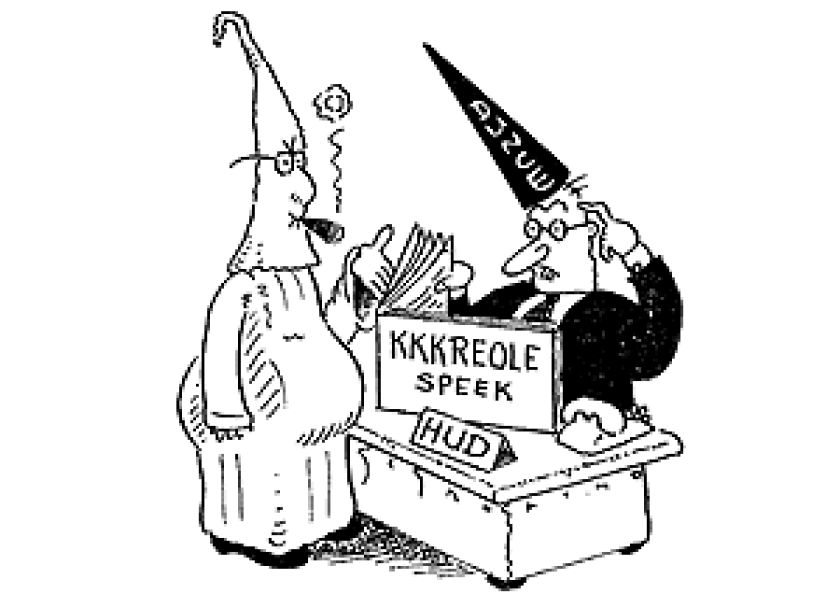Dear Cecil: I work for a university library that receives massive amounts of federal government documents. The shipment I opened today included multiple translations of a pamphlet from the Department of Housing and Urban Development called Resident Rights and Responsibilities in Spanish, French, Ethiopian, Korean, Portuguese, Russian, and Creole. The last one stopped me, since I had never seen a document written in Creole. So I opened it and read it. A paragraph is included below. This is a joke, right? “Yuh as a rezedent, ave di rights ahn di rispansibilities to elp mek yuh HUD-asisted owzing ah behta owme fi yuh ahn yuh fambily. Dis is a brochure distributed to yuh cawze Hud ah provide some fawm ahf asistance aur subsidy fi di whole apawtment buildin. As ah pawt ahfits dedication fi maintain di bes pawsible living enviornment fi all rezedents, yuh HUD field affice encourage ahn suppowts …" I don’t mean to cast aspersions, but this looks like bad phonetics! What’s the deal, Cecil? (1) Is Creole a written as well as an oral dialect? (2) Is there any French or Spanish influence in Creole (that’s what I thought I would find)? (3) Are the above quotations formal written Creole? (4) If number three is false, how do I find out exactly who’s been bogarting the bowl on the job to produce this document? Eli Harvey, Palo Alto, CA
Cecil replies:
You skipped the best part: “We ave a pawtnaship wid everi rezedent of HUD-assisted owzing developments: HUD prowtekss di rights ahf di tenants, ahn tenants gauwd dem own right tru rispansible be’aviah. Owah goal is fi guh beyan dat pawtnaship ahn create a sense ahf community …” This is signed “Sekretary Andrew M. Cuomo fella.”
What do we have here: a sincere but spectacularly misguided attempt to speak di language ahf di pipple, or racist parody? Michael Kane, executive director of the Boston-based National Alliance of HUD Tenants, has no doubts: “This is a vicious racist joke,” he says. “It is clearly a malicious slur” that is “deeply insulting to African-American people.” Kane speculates that the brochure was created by a prankster using one of the burlesque “Ebonics translation programs” available on the Internet. He thinks the responsible party “should be identified and fired.”
I got conflicting stories from HUD. Initially I spoke to a junior PR staffer who said a version of the brochure in Haitian Creole, a French-based language, had been published in October 1998. (In linguistics, creole is a generic term for the melding of a dominant language with elements of a subordinate language. Both French- and English-based creoles are spoken in the Caribbean.) The English-based version cited above appeared earlier this year, but HUD withdrew it in September (and the Haitian Creole version as well) after a complaint was filed. Insisting no malice was intended, the HUD staffer said the brochure was prepared by a contractor. Fine — blame the writer.
That was on Friday. On Monday I heard from Ginny Terzano, HUD’s public affairs director, who called to say that the document was bogus: “This was not sanctioned or authorized by HUD. We did not knowingly distribute this. We think it is offensive and in extremely bad taste.” Having somehow gotten through the approval process, the brochure had a print run of 2,000 copies (a small quantity for HUD), 1,500 of which were distributed before someone higher up got wind of it. Says Terzano, “We are trying to get to the bottom of this.”
If the document was a prank, it was a clever one. “Whoever wrote the text used certain features to reproduce phonologically the peculiarities of Caribbean speech,” says Professor Salikoko Mufwene, chairman of the linguistics department at the University of Chicago and an expert in English-based creoles. Authentic touches include “owme” for home, “affice” for office, and “fambily” for family, as well as the word “fi” (to or for), which is heard in the English-based patois of Jamaica.
But no one with half a clue would seriously attempt to write such a brochure. One obvious problem: trying to produce a written document in what is primarily a spoken language. While a few French-based creoles such as Haitian have standardized spelling and are taught in the schools, English-based creoles don’t and aren’t. If a speaker of Caribbean English can read, he reads standard English.
Even if you accept HUD’s explanation you have to wonder what kind of review process would allow an embarrassment like this to get out the door. And if it was written in good faith, then, as Mufwene puts it, “They were stupid.” No foolin, mon.
Click here for a followup column.
Cecil Adams
Send questions to Cecil via cecil@straightdope.com.
